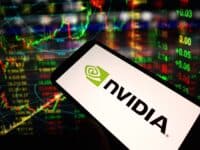

While it is probably inaccurate to call investors’ search for returns fashionable, over the years there have been significant shifts in appetite for particular stocks. In 2001, for example, General Electric was the largest U.S. company, with a market cap of $406 billion (in 2020 dollars). GE’s market cap in late December of 2020 is less than one-quarter of that.
[in-text-ad]
Five years later, in 2006, Exxon Mobil held the top spot with a market cap of $446 billion, and five years after that, the oil and gas giant was still the largest, although its market cap had dipped to $406 billion. Now, Exxon’s market cap has fallen to below $200 billion.
In 2020, there are just 38 U.S.-traded firms with a market cap above $200 billion, and just nine with a market cap above $500 billion. At the top, four companies are valued at $1 trillion or more, and all four are technology companies.
Apple
In August of 2018, Apple Inc. (NASDAQ: AAPL) became the first public U.S. company to reach $1 trillion in market cap. Two years later, the stock had doubled again and the market cap reached $2 trillion. The company’s market cap in late December 2020 is $2.14 trillion. Since 2010, Apple shares have appreciated by more than 1,150%. This year alone the stock is up 72%.
Since 2013, Apple has returned around $500 billion to shareholders in dividends and share buybacks, the largest capital return of any U.S. company, ever. In its 2020 fiscal year ended in September, Apple paid $14.1 billion in dividends and repurchased $72.4 billion in common stock. The company’s goal is to become cash neutral, and at the rate it is going, that is likely to happen sometime in 2023. After that, dividends will be paid out of cash flow.
Over the past 12 months, Apple stock has traded at around 36.8 times earnings. The price-to-earnings (P/E) ratio is expected to drop to 31.4 for the 2021 fiscal year, 28.8 for fiscal 2022 and 26.3 for fiscal 2023.
Microsoft
Microsoft Corp. (NASDAQ: MSFT) was the first of the big tech firms to shoulder its way into the 21st century’s most valuable companies. In 2001, just before the dot-com crash, Microsoft’s market cap was $365 billion, second only to GE. Five years later, that market cap had dwindled to $293 billion, still good enough for the fourth-highest valuation that year. Microsoft’s current market cap is around $1.66 trillion, trailing only Apple. The company’s stock has appreciated by nearly 900% since 2010 and trades higher by about 40% for the year.
Microsoft recently has been caught up in the hacking attack on network management software from SolarWinds. Microsoft’s networks were compromised by infected updates, but the company said Friday that it has found no evidence that its own systems were used to spread the attack to its own customers.
The company’s P/E ratio for the past 12 months is 33.8, and that is expected to fall to 32.3 in fiscal 2021, 29.2 in 2022 and 25.2 in 2023. Microsoft’s annual dividend is currently $2.24 per share, for a yield of 1.02%.
[in-text-ad]
Amazon
Amazon.com Inc. (NASDAQ: AMZN) was the fourth tech firm to join the trillion-dollar club, in February of this year. Since then, the e-commerce giant has added nearly 60% to raise its valuation to $1.59 trillion. There’s little question that the sharp growth since February is the result of the COVID-19 pandemic that has lifted U.S. consumer spending on e-commerce to unprecedented levels.
Along with the other tech giants, Amazon faces some potentially massive changes to its operations, particularly in Europe, where the European Commission has proposed a regulatory framework that would require the companies to police their content more aggressively than they do currently. New regulations limiting the companies’ use of their stored customer data to restrain competition are also being proposed. Penalties could be severe, with fines equal to as much as 10% of global turnover. In Amazon’s case, that could be up to $28 billion. Nothing will happen soon, but this is not particularly good news for any of the tech giants.
Over the past decade, Amazon’s shares have added more than 1,600%, and more than a third of that just since February. Over the past 12 months, Amazon stock has traded at a whopping P/E ratio of 90.1. That number is expected to reach 91.8 at the end of the 2020 fiscal year and then drop to 71.1 in 2021 and 50.5 by 2022.
Alphabet
The parent of Google, Alphabet Inc. (NASDAQ: GOOGL) is valued at $1.18 trillion, based on its Class A voting shares, and $1.19 trillion based on the price of its Class C non-voting stock (trading on the Nasdaq under the ticker symbol GOOG). The company is the youngest of the four, having come public in August 2004. Since then, shares have appreciated by nearly 1,000%.
While regulatory changes are challenging the tech giants in Europe, in the United States, the U.S. Department of Justice and Republican attorneys general from 11 states filed suit in October charging Google with anti-competitive behavior. Since then, two more lawsuits have been filed. In one, attorneys general from 38 states have charged Google with trying to extend its monopoly over general search to so-called vertical search for such things as airplane tickets and restaurants. The third lawsuit, brought by a smaller group of states, is seeking to sever Google’s digital advertising business from its search ad business. If any of these is successful, Alphabet could face some serious changes.
Alphabet’s P/E ratio for this year is expected to be around 33.4, before declining to 27.9 next year and 23.3 in 2022.
Take This Retirement Quiz To Get Matched With A Financial Advisor (Sponsored)
Take the quiz below to get matched with a financial advisor today.
Each advisor has been vetted by SmartAsset and is held to a fiduciary standard to act in your best interests.
Here’s how it works:
1. Answer SmartAsset advisor match quiz
2. Review your pre-screened matches at your leisure. Check out the
advisors’ profiles.
3. Speak with advisors at no cost to you. Have an introductory call on the phone or introduction in person and choose whom to work with in the future
Take the retirement quiz right here.
Thank you for reading! Have some feedback for us?
Contact the 24/7 Wall St. editorial team.



